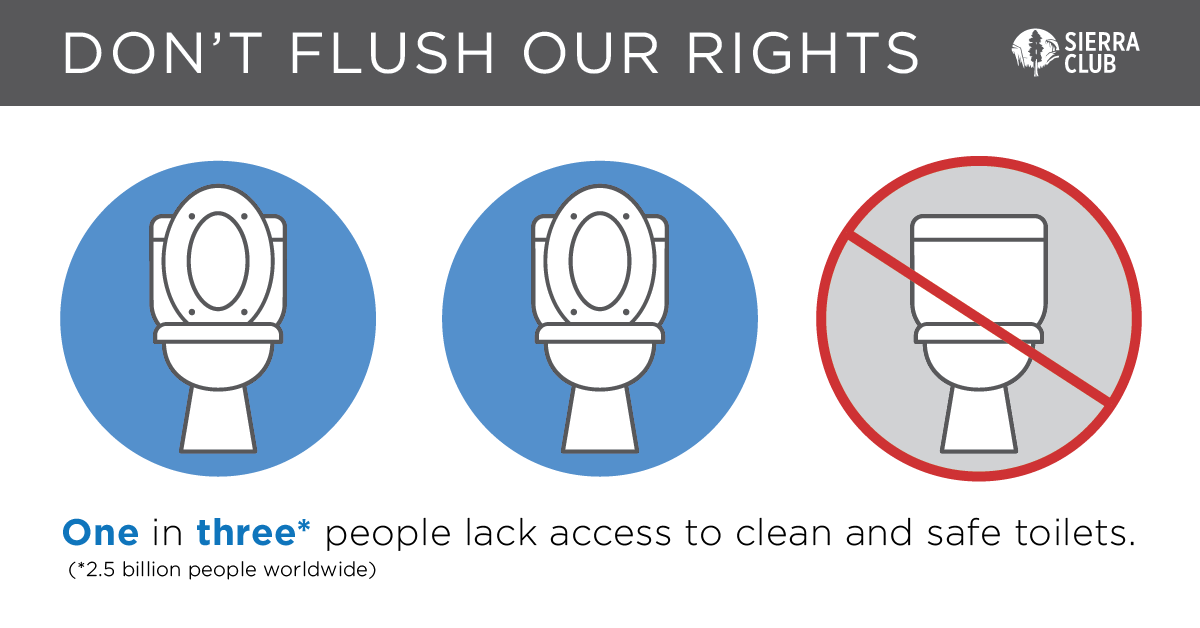Across the world, access to sanitation is widely considered a basic human right. However, globally one in three people lacks access to what the United Nations defines as safe and clean toilets. That’s 2.5 billion people without sanitation. Observed on November 19, World Toilet Day provides the UN a platform to highlight the importance of toilet access for health, dignity, and safety. We know that a healthy planet and healthy people go hand in hand, and access to sanitation is a crucial cornerstone to environmental health.
For women in developing countries, having access to toilets is important for many reasons. In terms of health, women and girls often have to delay “taking care of business” until they have a safe and clean place to relieve themselves. The wait alone can lead to infections and other health complications. Add these barriers to women’s menstrual hygiene needs and the lack of access to sanitation accounts to a serious limitation to education for girls, in particular, with many dropping out due to no private restroom availability. When a girl stays in school, she’s likely to marry and have children later and avoid the risks of early pregnancy and childbirth. With education, girls and women have increased access to the halls of power, such as the ability to engage in economic, political and environmental decision-making from the household to the national level.
To date, roughly 90 percent of sewage is discharged untreated into rivers, lakes and coastal areas. By improving water and sanitation access, the UN has shown that for every $1.50 spent on a water and sanitation programme, $12 is returned through saved time, increased productivity, and reduced health costs. This means that beyond personal relief, access to clean and safe toilets reduces both child and maternal mortality. Each year, an estimated 2.5 billion cases of diarrhea occur among children under the age of five. But water and sanitation interventions, like access to toilets, can reduce childhood diarrhea deaths by 88 percent. With adequate sanitation and water access, women have more time to be drivers of positive change in their communities such as reducing poverty, maternal and infant mortality, and child malnutrition rates.
Array
Three Mothers, Three Stories (Narrated by Jodie Foster)
Beyond these health risks, poor access to toilets exacerbates gender-based violence by increasing vulnerability of women and girls who must walk vast distances alone, sometimes at night, to isolated areas. All of these considerations must be taken into account when creating conservation solutions for clean and safe sanitation for communities.
Whereas the United Nations World Toilet Day specifically speaks to the concerns of people in developing countries, it’s important to understand that safe sanitation for all is not necessarily the case in the United States, either. The lack of access to safe restrooms for transgender and gender non-conforming citizens is an urgent matter. Facing similar health challenges that women in developing countries face when forced to wait to relive themselves for long hours, those in the trans community also face gender-based violence as an obstacle to restroom access. “Roughly 70% of trans people have reported being denied entrance, assaulted, or harassed while trying to use a restroom," according to a 2013 Williams Institute report. While the bathroom infrastructural needs in the United States differ from those in developing countries, they are no less urgent for health and safety in the realm of sanitation.
The UN Sustainable Development Goals (SDGs) directly address this need. In Goal 6 of the SDGs there is a target aimed to end open defecation by providing sufficient sanitation systems and ensuring clean water access to all. While this is an important start, we can push our governments to do better.
As environmentalists, we advocate for human rights on a healthy planet. Together, we can heed the rallying cry of World Toilet Day to make “sanitation for all” the reality at home and abroad. Join us as we call on the U.S. government to support the accessibility of gender-inclusive restroom facilities and to push global sanitation priorities through integrated programming within USAID, and ensure that all people have the access to sanitation they rightly deserve.